As Hurricane Milton moves toward Florida’s Gulf Coast, people are preparing for what experts say could be the worst storm in over 100 years. With huge storm surges and strong winds expected, the region is on high alert, and evacuation orders are being issued.
Hurricane Milton is gaining strength fast, and experts warn it could be one of the most dangerous storms in recent times. Many areas are already vulnerable due to past storms, increasing the risk of widespread damage and flooding.
Evacuation orders are in place, and officials are urging people to take the storm seriously and prepare for life-threatening conditions. Safety is the main focus as the storm approaches, and the next few days will be crucial for those in its path.
### Hurricane Milton: A Record-Breaking Storm
Hurricane Milton has grown into a Category 5 storm, one of the most dangerous types on the Saffir-Simpson scale. With winds over 157 mph, it could cause massive destruction along its path.

The National Hurricane Center warns that homes could be destroyed, trees and power lines will fall, and some places might not be livable for weeks or even months. They said, “A high percentage of framed homes will be destroyed, with total roof failure and wall collapse.”

Storm surges could be especially bad, with water levels rising up to 12 feet in some areas. This could be the worst surge the Tampa Bay area has seen in nearly 100 years. Just weeks ago, Hurricane Helene caused floods with an 8-foot water surge.
Milton is expected to bring even worse flooding. While the storm may weaken to a Category 3 by the time it hits Florida, it will still be dangerous. With winds up to 129 mph, even strong homes could suffer major roof damage, and trees are likely to be uprooted.
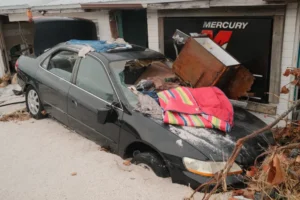
Many are comparing Milton to past hurricanes like Irma (2017) and Betsy (1965). But what makes Milton particularly dangerous is the debris left behind by Hurricane Helene, which could worsen the damage.
### Warnings from Officials: The Call to Evacuate
As the hurricane nears, local authorities are giving strong warnings to people in at-risk areas. Tampa Mayor Jane Castor warned, “[If you] stay in one of those evacuation areas, you’re gonna die.”

She said that while past storms like Hurricane Helene were bad, Milton could bring destruction on a whole new level. Pinellas County Sheriff Bob Gualtieri echoed this, calling for the largest evacuation since Hurricane Irma in 2017.
“This is going to be bad. Everyone just needs to get out,” he said. Governor Ron DeSantis also spoke of the risks, saying, “There are areas with a lot of debris… if hit by a major hurricane, it’s going to dramatically increase damage.”

Evacuation orders are in place, and local authorities stress that those who don’t leave will be on their own when the storm hits. Many who stayed behind in past hurricanes are now taking these warnings seriously.
### Evacuation Efforts in Full Swing
With Hurricane Milton approaching Florida’s Gulf Coast, evacuation efforts are in motion. Local authorities have ordered mandatory evacuations for several coastal communities, urging people to leave before it’s too late.
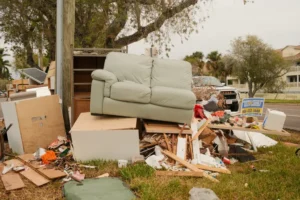
Traffic is heavy on highways as thousands of residents move inland to escape the storm. On Interstate 75, northbound lanes were packed with cars heading toward the Florida Panhandle.
Others sought shelter in places like Fort Lauderdale and Miami, which are expected to be less affected. Meanwhile, southbound lanes were nearly empty. Communities hit hard by past storms aren’t taking chances this time.
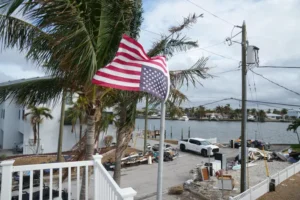
In Fort Myers Beach, a town devastated by Hurricane Ian two years ago, streets were empty as residents packed up and left, with only a few people staying behind to secure their homes.
Those who remember the severe flooding caused by Ian’s 15-foot storm surge know the danger is real and are taking steps to avoid a repeat of past tragedies.
As Hurricane Milton nears, people in high-risk areas need to know their evacuation zones and routes. The Florida Division of Emergency Management has a “Know Your Zone” tool, helping residents find their zone by entering their address.

This tool is especially important as evacuation orders continue to come for coastal areas along the Gulf Coast. Several counties are advising residents to check both their evacuation and storm surge zones.
Counties like Hillsborough, Pinellas, Manatee, and Pasco have issued immediate evacuation orders for areas most at risk. Coastal communities in these regions must evacuate quickly.
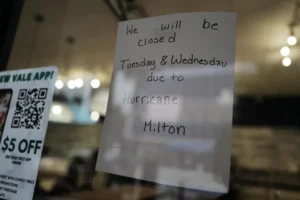
Other counties, like Polk and Highlands, don’t have mandatory evacuations but recommend sheltering in place. Sarasota, Citrus, and Hernando counties are also monitoring storm surge zones for possible evacuations.
Officials emphasize the importance of knowing your evacuation zone and finding the nearest shelters and safe routes. Those who stay may face the full force of the storm, with emergency services likely unavailable once conditions worsen.
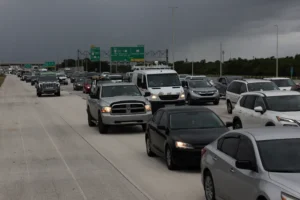
The “Know Your Zone” map offers an easy way for residents to plan their safest escape route. By using this resource and acting quickly, people can protect themselves and their families from Hurricane Milton’s potential devastation.
Shе Wаs Тhе Ноttеst Сеlеbrity In Тhе Wоrld 20 Yеаrs Аgо, Вut Тоdаy I Саn’t Rесоgnizе Неr
Pamela Anderson, the iconic Baywatch star and Canadian-American beauty, is making headlines again, and this time it’s not for her red swimsuit running down the beach. In the latest Proenza Schouler SS/24 campaign, Anderson continues to embrace her fresh-faced look and defies age, showcasing her timeless beauty. The luxury women’s fashion brand, established in 2002 by Jack McCollough and Lazaro Hernandez, couldn’t have chosen a more fitting muse to represent their collection.
In the campaign, Pamela Anderson appears ageless, with minimal makeup that accentuates her natural beauty. She graces the camera wearing the New York label’s stunning $1,790 ‘Lara Knit Dress’ in vibrant red. However, what’s truly remarkable is that it seems Anderson is wearing little to no makeup, except for a touch of lip gloss.
The decision to showcase Anderson’s natural beauty is not accidental. The 56-year-old actress and model has been an advocate for embracing one’s true self and challenging conventional standards of beauty. In a recent interview with Vogue France, she shаrеd her perspective, saying, “I’m not into the makeup look right now. My mom always told me, ‘At some point in your life, you’re not going to want to wear makeup on your skin.’ And she’s right.”
This isn’t the first time Pamela Anderson has boldly embraced her natural look. Last October, during Paris Fashion Week festivities, she proudly announced her decision to wear only her DIY rose oil on her alabaster complexion. This move reflects her commitment to authentic beauty and her desire to inspire others to embrace their natural selves.Behind the scenes of this stunning campaign, Anderson had the support of her trusted makeup artist, Cyndle Komarovski, who also worked with her for the Daily Front Row’s Fashion Media Awards in Manhattan on September 8, where she accepted the Style Icon Award. Cyndle’s minimalistic approach to makeup perfectly aligns with Anderson’s vision of beauty, allowing her natural radiance to shine through.
Hairstylist Karim Belghiran and nail artist Alicia Torello completed Anderson’s look for the Proenza Schouler campaign. They transformed her signature blonde mane, taking out some volume, and applied a classic red manicure, enhancing her timeless style. The entire look was curated by stylist Thistle Brown, who ensured Anderson’s effortless beauty was front and center.
In addition to her stunning appearance in the Proenza Schouler campaign, Pamela Anderson has been making waves in her career. She’s currently working on a cookbook, fulfilling a lifelong dream. “This has always been my dream to have a cooking show. Always, always, always,” Anderson shаrеd. “Brandon came to me and said, ‘Mom, your dream is going to come true.’ And now we are on Food Network Canada, which is even better because I am so insistent on doing Canadian projects and working with Canadian production companies.”Pamela’s Cooking With Love, her upcoming vegan cooking show, is set to premiere later this year on Food Network Canada.
Anderson’s passion for cooking and her commitment to a plant-based lifestyle have come together to create a show that promises to delight viewers with delicious and nutritious meals. Anderson expressed her excitement about the show, saying, “Michelin star chefs, James Beard Award winners, and all these incredible chefs from all over the world came to my little barn on the island, and we cooked the most amazing mind-blowing meals. I mean, my head just exploded every episode. I was so excited! I was likе a sponge, just soaking it all in!”
In addition to her flourishing career, Pamela Anderson is also a proud mother of two sons, Brandon Thomas Lee and Dylan Jagger Lee. Both of them showed their support for their mother’s Proenza Schouler campaign by Instastorying it with supportive emojis. Pamela welcomed these two talented young men during her three-year marriage to three-time Grammy nominee Tommy Lee, which ended in 1998.
As Pamela Anderson continues to inspire us with her beauty, authenticity, and resilience, it’s clear that age is just a number. Her timeless elegance and unwavering commitment to embracing her true self make her an icon for generations to come. In a world often obsessed with youth and superficial beauty, Pamela Anderson reminds us that the real essence of beauty lies in being confident in who we are.

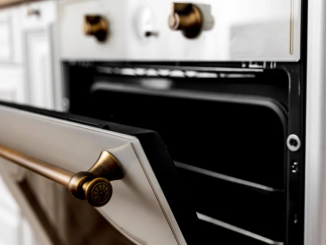

Leave a Reply